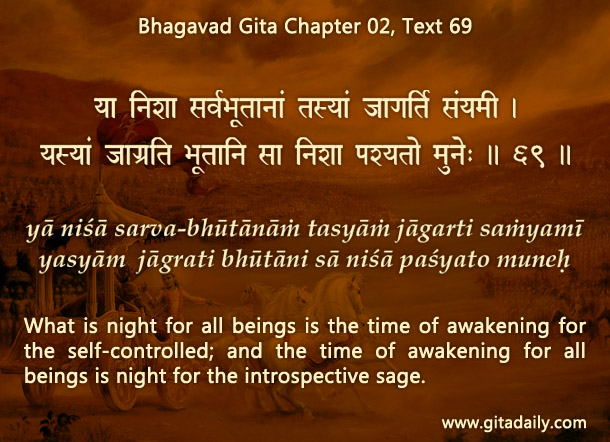 The Bhagavad-gita’s second chapter is essentially Krishna’s summary answer to Arjuna’s central question in the Gita (02.07): what is dharma, the right thing to do? While Krishna answers the question at various levels, the essence is that right activity is founded in right identity: those who understand that they are at their core spiritual beings strive to act with detachment (asakti) for gaining spiritual realization (yoga). This verse (69) describes how such spiritualists act.
The Bhagavad-gita’s second chapter is essentially Krishna’s summary answer to Arjuna’s central question in the Gita (02.07): what is dharma, the right thing to do? While Krishna answers the question at various levels, the essence is that right activity is founded in right identity: those who understand that they are at their core spiritual beings strive to act with detachment (asakti) for gaining spiritual realization (yoga). This verse (69) describes how such spiritualists act.
Within the second chapter, the last section (54-72) is essentially an answer to Arjuna’s question (54): what are the characteristics of a person situated in knowledge (sthita-prajna)? In answering this question, Krishna integrates description with prescription — that is, he doesn’t just tell how such spiritually evolved souls function; he also tells how spiritual aspirants can strive toward that level of consciousness. This verse (69) is a part of that prescription.
Actually, Arjuna’s question (54) has four parts. And this verse addresses the fourth part of the question: How do spiritualists engage their senses and function in the world while still maintaining spiritual consciousness?
While answering this sub-question, Krishna emphasizes that though spiritualists move about in the world, they don’t let their senses roam randomly (02.68); otherwise, such roaming can be the cause of delusion, degradation, destruction (02.67). Krishna’s emphatic directive raises an understandable concern: Most people routinely dwell on, even delight in, tempting objects — staring at them, fantasizing about them, gossiping about them. Won’t that make spiritualists who abstain from similar action be the odd people in society? Acknowledging this reality, this verse (69) underscores how spiritualists (have to) stand apart from most of the world — in terms of their defining values and their driving purposes, they will be as different from those of materialistic people as day is from night. But won’t functioning among such materialists subject spiritualists to temptation? The next verse (70) answers: spiritualists, by their realization of higher realities, are so internally full and fulfilled that tempting stimuli can flow into their consciousness without actually tempting them — and thus they can attain lasting peace.
One-sentence summary:
Gita 02.69 highlights a key characteristic of spiritualists who are engaged in the world without being entangled in it: they are (ready to be) radically different from materialists.
Think it over:
- While moving about in the world, what do spiritualists need to be vigilant about?
- Why may spiritualists be seen by the world as odd?
- While functioning in the world, how do spiritualists deal with tempting stimuli?
***
02.69: What is night for all beings is the time of awakening for the self-controlled; and the time of awakening for all beings is night for the introspective sage.
To know more about this verse, please click on the image


Excellent
Thanks.
Dandavat Prabhuji.Thank you very much for this article. This current series of 7 levels of interpretations of Gita deserves a new book and a full fledged Sastric course in itself. Thank you so much for enlightening us by presenting deepest spiritual truths in such simple and succinct words.
Thanks for your suggestion and appreciation. Yes, I will be working on explaining key Gita verses at these various levels and eventually making those articles into a book.
dont’ understand why there is in-between verses in the picture -Confusing.
It indicates the level of the analysis: 54-72 refers to the section with the focus on 69 in that section.